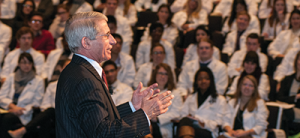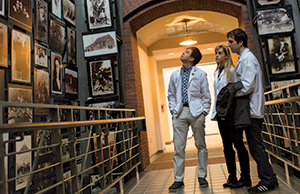At the start of the 2014-15 academic year, incoming M.D. program students in the GW School of Medicine and Health Sciences (SMHS) began a rigorous journey that will ultimately lead them to careers in medicine. Highlighting that path to clinical practice is a new element of the school’s recently revised curriculum that helps expose students to the advantages of being in the nation’s capital; the integration of clinical public health into physician training. To help accomplish that goal, a new multiday intersession workshop has been added to the end of the fall and spring semesters to offer students real-world, Washington, D.C.-based experiences to prepare for their expanded scope of practice.

“GW students will continue to graduate as excellent clinicians, but they will practice in a health care system that is changing dramatically,” says Lawrence “Bopper” Deyton, M.D. ’85, M.S.P.H., senior associate dean for clinical public health and professor of medicine at SMHS. “In order to be successful clinicians and leaders in that changing environment, GW students must expand their scope of practice to include clinical public health. They must know how to use the principles and practices of public health and population health. And we must teach them how to do that.”
At the conclusion of the fall 2014 semester — and immediately after their infectious disease/immunology and virology coursework — first-year M.D. students embarked upon an intensive multi-day clinical public health workshop, titled “How Physicians Can Help Create an AIDS-Free Generation.” The seminar concluded with a White House event featuring top government and public health HIV/AIDS leaders, where student working groups presented community-based plans to improve the HIV care continuum.
The inaugural clinical public health intersession workshop was designed to introduce medical students to the HIV care continuum and their role as practicing physicians to help end the HIV/AIDS epidemic. The goal was not just to identify what needs to be done to improve the HIV care continuum, but also to identify how to do it at the community level.
“Dramatic progress has been made in the last generation to turn HIV infection from a uniformly fatal disease to a chronic, treatable condition. However, at the community level there continues to be obstacles that impede efforts to reduce new HIV infections and AIDS cases,” says Deyton. He explains that the HIV care continuum is a sequence of actions used by clinicians, public health, and policy leaders to reduce community obstacles that perpetuate a preventable cycle of HIV infection. A successful continuum will lead to an AIDS-free generation. The goal of the multi-day exercise, Deyton adds, “was for the students to propose how to correct a problem, not just define a problem.”
To jump-start the workshop, local and national HIV/AIDS experts including Anthony Fauci, M.D., director of the National Institute of Allergy and Infectious Diseases, addressed the current HIV landscape and the latest scientific advances, treatment, and prevention programs.
“Since the start of the AIDS epidemic, more than 78 million people have been infected with HIV, almost 40 million deaths, 35 million people living with HIV, and it’s still ongoing, and it’s out of control in many respects,” says Fauci. He opened the course with his talk, “Ending the HIV Epidemic: From Scientific Advances to Public Health Implementation.”
Over the remainder of the workshop, students received access to community experts, as well as the opportunity to visit Washington, D.C.’s Whitman-Walker Clinic to meet with staff and patients to gain firsthand perspectives about barriers to care. Students made site visits throughout the community, conducted research, and brainstormed to create innovative proposals that were both science-based and community-oriented.
For first-year SMHS medical student Michael Kahn, having this opportunity and access to policymakers is unique to being in Washington, D.C. “I think it’s one of the draws of this medical school; it’s one of the reasons I chose to come here,” he said.
Fauci, an active clinician, immunologist, and researcher noted for his leadership in the development and implementation of significant legislation in the fight against HIV/AIDS, warned that although “we have accomplished a lot and have a lot to be proud of as a nation, as scientists, as clinicians, there is still work to be done.” In the United States, he says, detailing the gravity of the ongoing epidemic, “there are 1.2 million people living with HIV, of whom 14 to 16 percent are unaware of their infection.” He encouraged the future physicians to take an active role in policy work and focus on “hot spots” or specific communities rather than think about “one-size-fits-all” prevention plans.

“The end of the HIV/AIDS pandemic is a feasible goal; however, there is still much to do,” insists Fauci. “Now is not the time for a victory lap, but the time for racing ahead. This is particularly relevant for you in this class, because it’s going to be up to you to bring this over the goal line.”
Maggie Czarnogorski, M.D., RESD ’06, FEL ’08, M.P.H. ’14, senior policy advisor at the Office of National AIDS Policy at the White House, also took the stage to discuss the HIV care continuum. “When we talk about the care continuum, this is what we are talking about: it’s a framework for looking at people from the time they are infected through their course of treatment to that ultimate health outcome, which is viral load suppression.”
Ron Valdiserri, M.D., M.P.H., deputy assistant secretary for health for infectious diseases and director of the Office of HIV/AIDS and Infectious Disease Policy at the U.S. Department of Health and Human Services, rounded out the discussion, describing the evolution of HIV/AIDS testing, treatment, and prevention programs.
On day two of the program, students were asked to define challenges, identify successful best practices, facilitate discussion, and propose areas for immediate research as they pertain to the HIV care continuum. The students canvassed the city, speaking with community leaders and experts in the field to aid their research efforts.
The program culminated at the White House with a presentation of public health recommendations by each group before a panel of HIV/AIDS experts including Czarnogorski; Douglas M. Brooks, director of the White House Office of National AIDS Policy (the AIDS Czar); Laura Cheever, M.D., associate administrator for HIV/AIDS at the U.S. Department of Health and Human Services, Health Resources and Services Administration (HRSA); Deborah Parham-Hopson, Ph.D., assistant surgeon general and senior advisor for HIV at HRSA; and Greg Millett, M.P.H., vice president and director for public policy at the American Foundation for AIDS Research. The students offered their policy recommendations on HIV/AIDS testing, screening, prevention, and access to antiviral drugs in the District of Columbia.
“The tools are out there; it’s just about getting the correct information out there and making everyone aware that these tools exists,” says Haydee Del Calvo, first-year SMHS medical student, reflecting upon what she learned over the course of the exercise.
“As a dean of a medical school who sees himself, along with Dr. Deyton, as an HIV/AIDS activist and physician-activist from the ’80s, to sit here and see you guys investing your time, energy, creativity, and brilliance in helping us come to an AIDS-free generation is really overwhelming,” says Jeffrey S. Akman, M.D. ’81, RESD ’85, Walter A. Bloedorn Professor of Administrative Medicine, vice president for health affairs, and dean of SMHS.
For Kahn, exposure to the nation’s policymakers and change-agents was invaluable. “Getting the chance to see a microcosm of the process, from having an idea, to brainstorming with your peers, to having the opportunity to present your plan to the people who can make change gives us the idea that maybe someday down the line we can do this on a much larger scale.”
A second clinical public health intersession will begin at the conclusion of the spring 2015 semester (after press time). Following the students’ classes on pulmonary medicine and immunology/allergy this session will challenge students to “Eliminate Childhood Asthma in Washington, D.C.” Leading the second workshop is Stephen J. Teach, M.D., M.P.H., professor and chair of the SMHS Department of Pediatrics, as well as director and principal investigator of IMPACT DC, a pediatric asthma clinic based at Children’s National Health System.
“The District of Columbia and many similar urban environments constitute a perfect storm of adverse circumstances for diseases such as asthma,” explains Teach. “In the District, we have genetic and epigenetic factors contributing to very negative environmental factors including poverty, poor housing, and inadequate access to primary care. We all are excited to hear how our future physicians want to tackle these complex community health problems. We need them to succeed.”
Related Content:
- Link to Revised M.D. Curriculum



